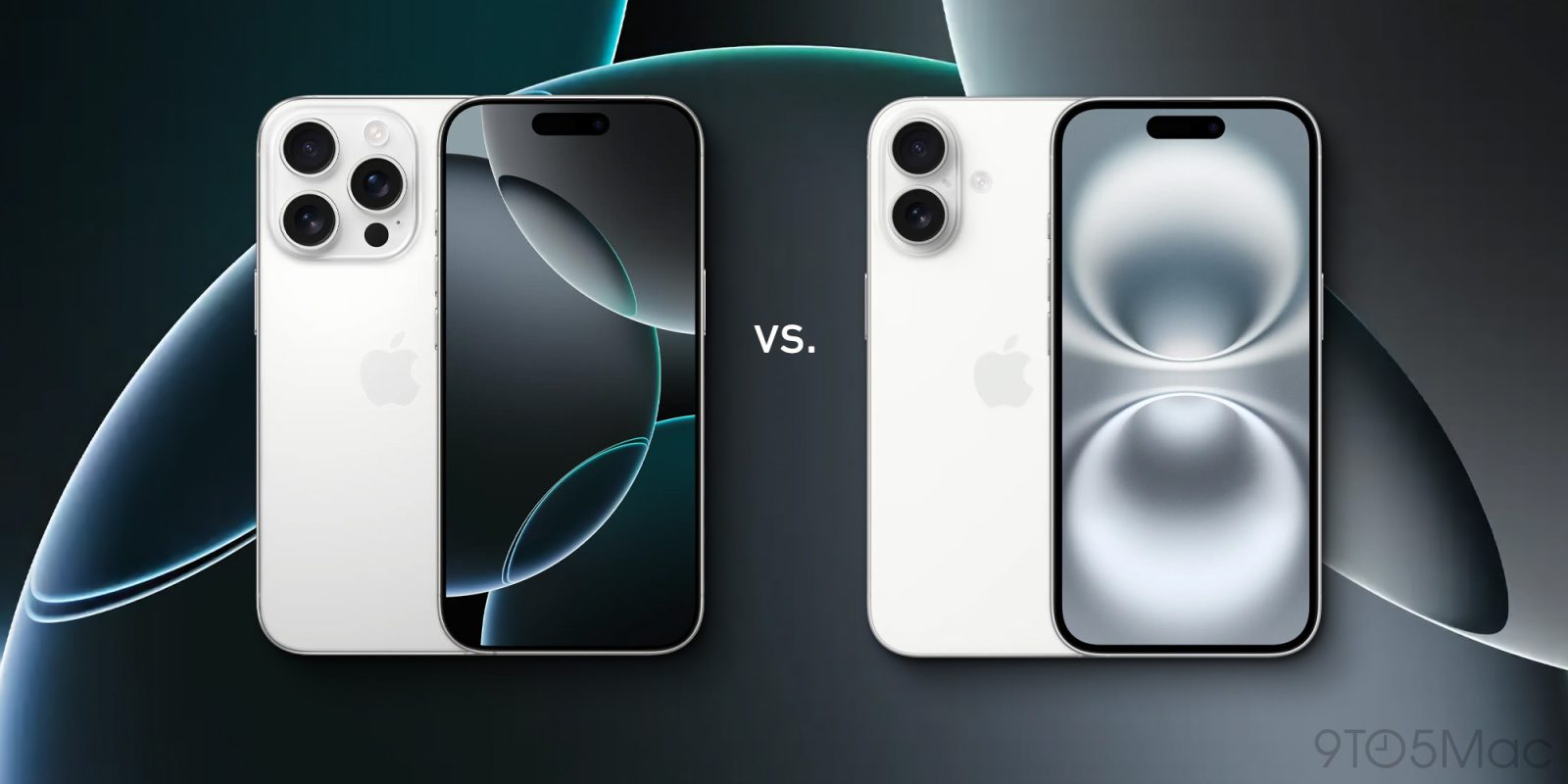
iPhone 16 and 16 Pro are Apple’s newest and most capable smartphones. While the iPhone 16 Pro is naturally more feature-rich and powerful, the iPhone 16 has gained pro features, closing the gap between the standard and pro models. Read on for a detailed look at iPhone 16 vs 16 Pro for all the differences and advice on which to buy.
Table of contents
iPhone 16 vs 16 Pro
Screens
With the iPhone 14 and 15 lineups, Apple used the same display sizes for all four of the standard and Pro devices.
That changes with the iPhone 16 lineup as the Pro models feature larger 6.3 and 6.9-inch displays and the iPhone 16 and 16 Plus have 6.1 and 6.7-inch screens.
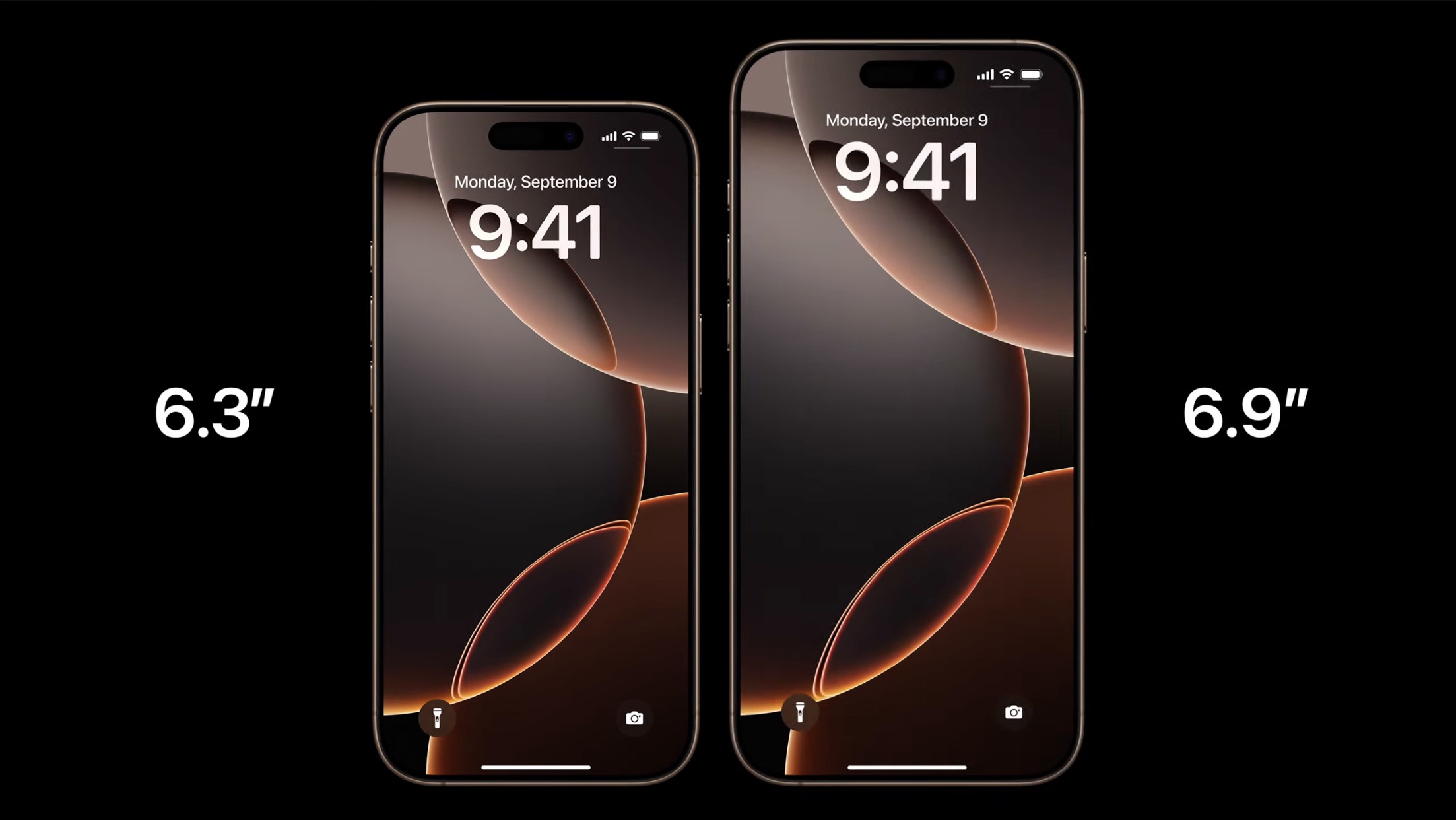

Screen brightness remains the same between the 16 Pro and 16 models. However, the 16 Pro and Pro Max are the only devices with Always-On displays and ProMotion (up to 120Hz refresh).
| iPhone 16 | iPhone 16 Plus | iPhone 16 Pro | iPhone 16 Pro Max | |
| Size | 6.1-inches | 6.7-inches | 6.3-inches | 6.9-inches |
| Resolution | 2556 x 1179 pixels | 2796 x 1290 pixels | 2622 x 1206 pixels | 2868 x 1320 pixels |
| PPI | 460 ppi | 460 ppi | 460 ppi | 460 ppi |
| Super Retina XDR OLED | ✅ | ✅ | ✅ | ✅ |
| Dynamic Island | ✅ | ✅ | ✅ | ✅ |
| ProMotion – adaptive refresh up to 120Hz | ❌ | ❌ | ✅ | ✅ |
| Always-On display | ❌ | ❌ | ✅ | ✅ |
| Typical max brightness | 1000 nits max | 1000 nits max | 1000 nits max | 1000 nits max |
| HDR max brightness | 1600 nits max | 1600 nits max | 1600 nits max | 1600 nits max |
| Outdoor max brightness | 2000 nits max | 2000 nits max | 2000 nits max | 2000 nits max |
| True Tone | ✅ | ✅ | ✅ | ✅ |
| Haptic Touch | ✅ | ✅ | ✅ | ✅ |
| Wide color (P3) | ✅ | ✅ | ✅ | ✅ |
While the displays are identical when it comes to features between all the models outside of Always-On and ProMotion, and the new sizes, the iPhone 16 Pro and Pro Max have one other upgrade – slimmer bezels.
Size, weight, design
The design of the iPhone 16 and 16 Pro remains very similar overall to its recent predecessors, but Apple has included the new physical Camera Control button/sensor in all of the iPhone 16 devices.
Apple is continuing to use titanium for the 16 Pro and Pro Max and aluminum with the 16 and 16 Plus.
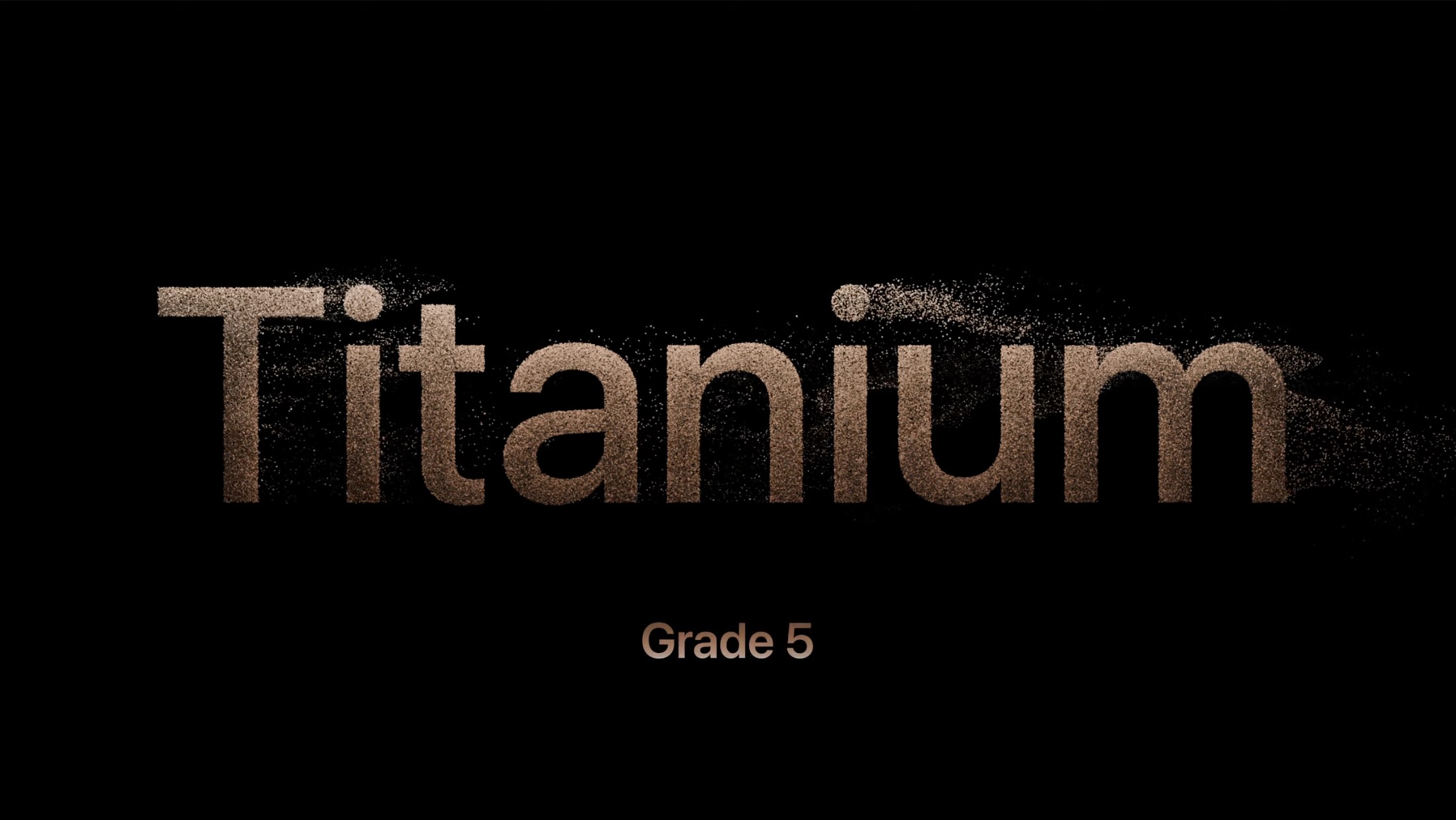
Along with the new Camera Control, iPhone 16 gets the physical Action button which was originally launched on iPhone 15 Pro. And the rear camera layout has been updated with the 16 and 16 Plus.
For size, weight, and materials, here’s iPhone 16 vs 16 Pro:
| iPhone 16 | iPhone 16 Plus | iPhone 16 Pro | iPhone 16 Pro Max | |
| Height | 5.81-inches (147.6 mm) | 6.33-inches (160.9 mm) | 5.89-inches (149.6 mm) | 6.42-inches (163 mm) |
| Width | 2.82-inches (71.6 mm) | 3.06-inches (77.8 mm) | 2.81-inches (71.5 mm) | 3.06-inches (77.6 mm) |
| Thickness | 0.31-inches (7.80 mm) | 0.31-inches (7.80 mm) | 0.32-inches (8.25 mm) | 0.32-inches (8.25 mm) |
| Weight | 6.00-ounces (170 grams) | 7.03-ounces (199 grams) | 7.03-ounces (199 grams) | 7.99-ounces (227 grams) |
| Durability | IP68 (splash, dust, 6 meters of water up to 30 minutes | IP68 (splash, dust, 6 meters of water up to 30 minutes | IP68 (splash, dust, 6 meters of water up to 30 minutes | IP68 (splash, dust, 6 meters of water up to 30 minutes |
| Ceramic Shield front | ✅ | ✅ | ✅ | ✅ |
| Back material | Color-infused glass | Color-infused glass | Textured matte glass | Textured matte glass |
| Frame/edges | Aluminum | Aluminum | Grade 5 Titanium | Grade 5 Titanium |
With the iPhone 16 Pro and Pro Max having slimmer bezels, Apple can fit the larger screens in overall dimensions close to the iPhone 16 and 16 Plus.
Naturally, the new iPhones also come in new colors, we’ll get into that in detail below.
Performance – A18 vs A18 Pro
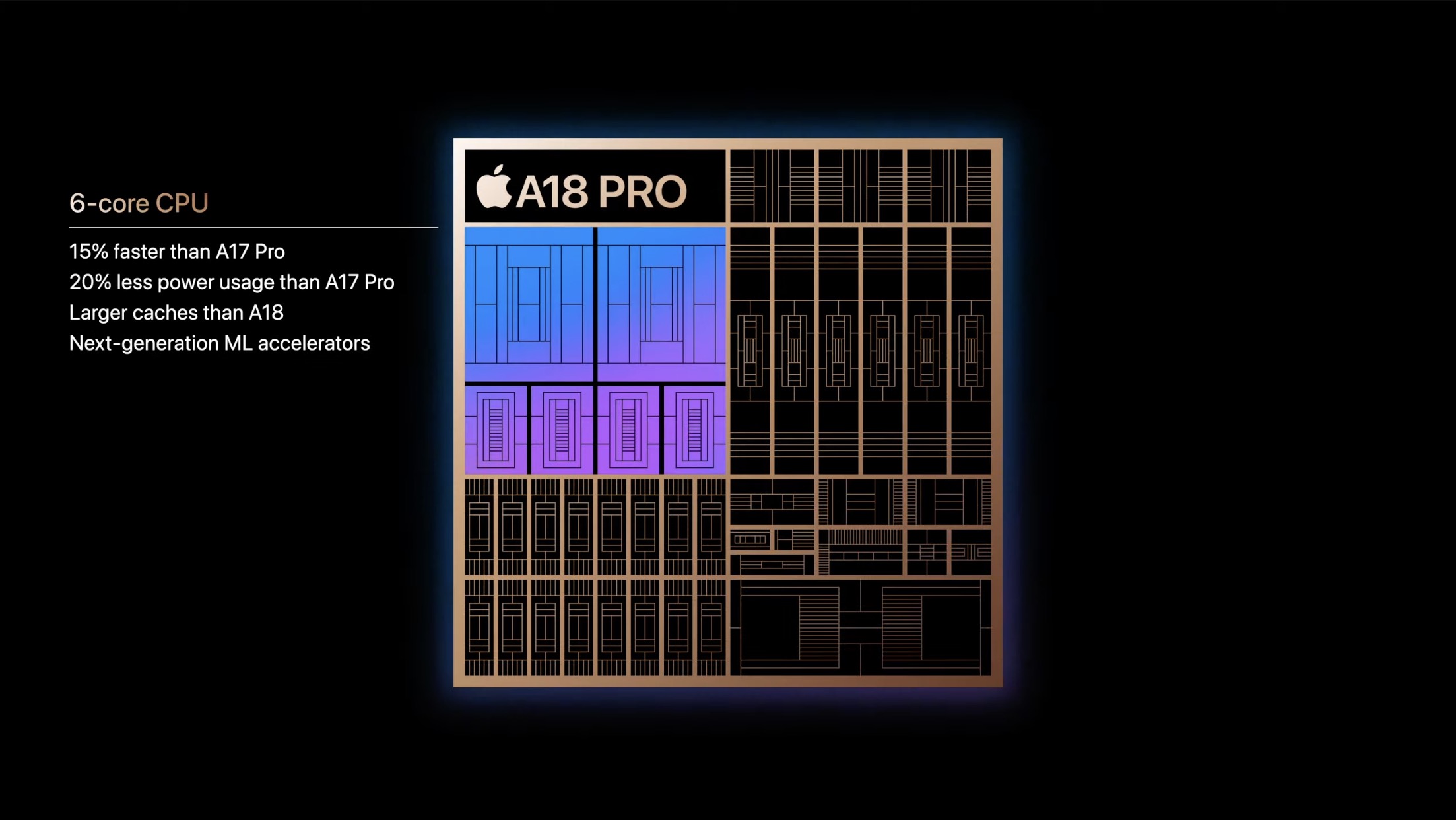
With iPhone 14 and 15 devices, Apple used the latest A-series chip in the Pro models and used the previous year’s chip in the standard models.
That changes this year with the iPhone 16 and 16 Plus getting the new A18 chip with the iPhone 16 Pro and Pro Max getting the A18 Pro.
With the only previous iPhones to support Apple Intelligence being the 15 Pro and Pro Max, both the standard and pro models of iPhone 16 support the feature(s).
| iPhone 16 | iPhone 16 Plus | iPhone 16 Pro | iPhone 16 Pro Max | |
| SoC | A18 | A18 | A18 Pro | A18 Pro |
| CPU | 6-core: 2 performance + 4 efficiency | 6-core: 2 performance + 4 efficiency | 6-core: 2 performance + 4 efficiency | 6-core: 2 performance + 4 efficiency |
| GPU | 5-core | 5-core | 6-core | 6-core |
| Neural Engine | 16-core | 16-core | 16-core | 16-core |
| RAM | 8GB | 8GB | 8GB | 8GB |
| Apple Intelligence support | ✅ | ✅ | ✅ | ✅ |
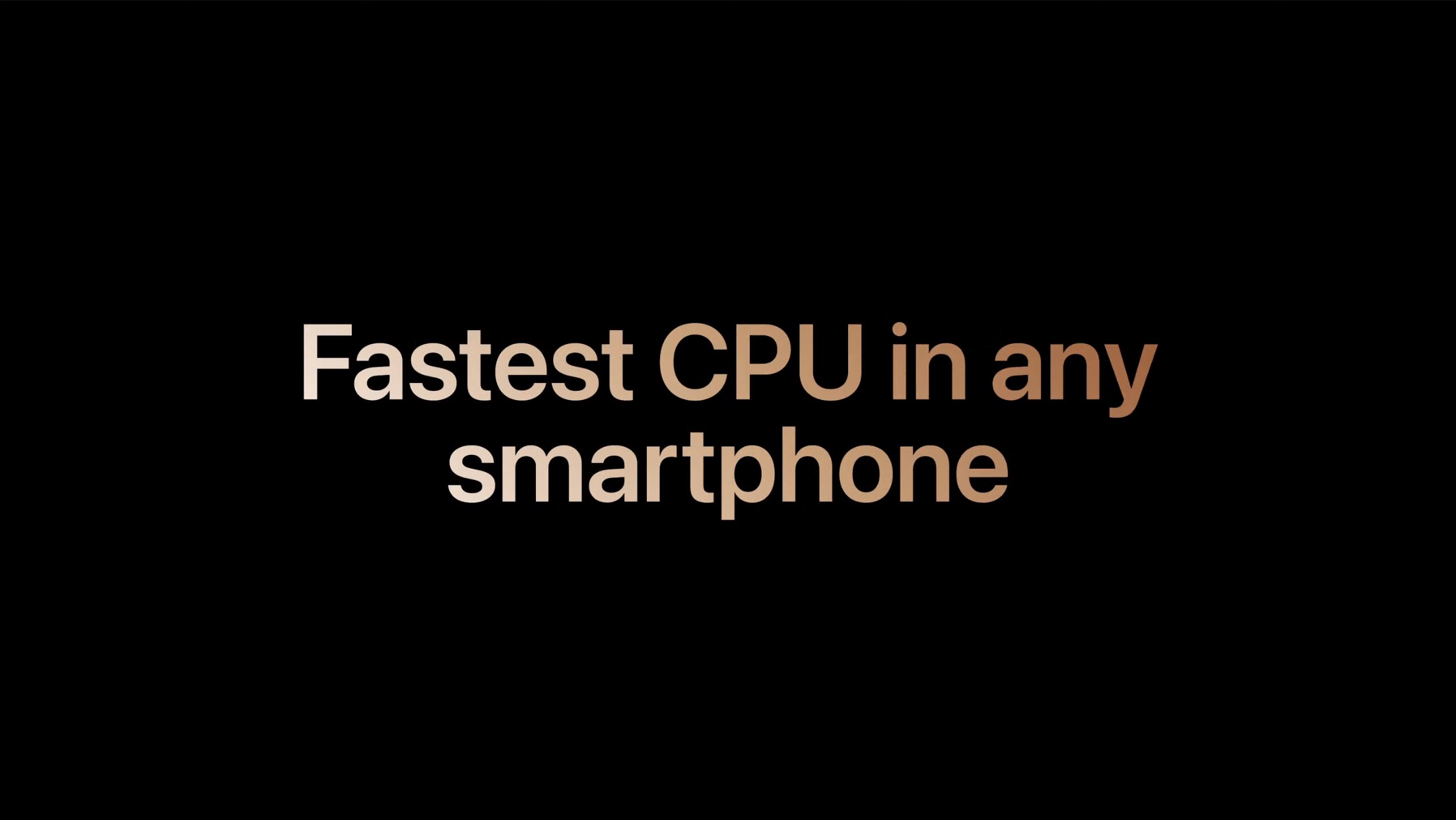
Both the A18 and A18 Pro are more than powerful enough for almost everyone. But here are some stats from Apple:
- A18 Pro CPU is up to 15% faster than A17 Pro
- A18 Pro GPU is up to 20% faster than A17 Pro
- A18 Pro CPU uses up to 20% less power than A17 Pro
- 2x faster ray tracing than A17 Pro
- A18 CPU is up to 30% faster than A16 Bionic
- A18 GPU is up to 40% faster than A16 Bionic
- A18 CPU uses up to 30% less power than A16 Bionic
- A18 GPU uses up to 35% less power than A16 Bionic
Also, A18 is the first chip in a non-pro iPhone to offer hardware-accelerated ray tracing.
We’ll update this comparison when we have real-world data on how A18 Pro vs A18 compare directly.
Battery life
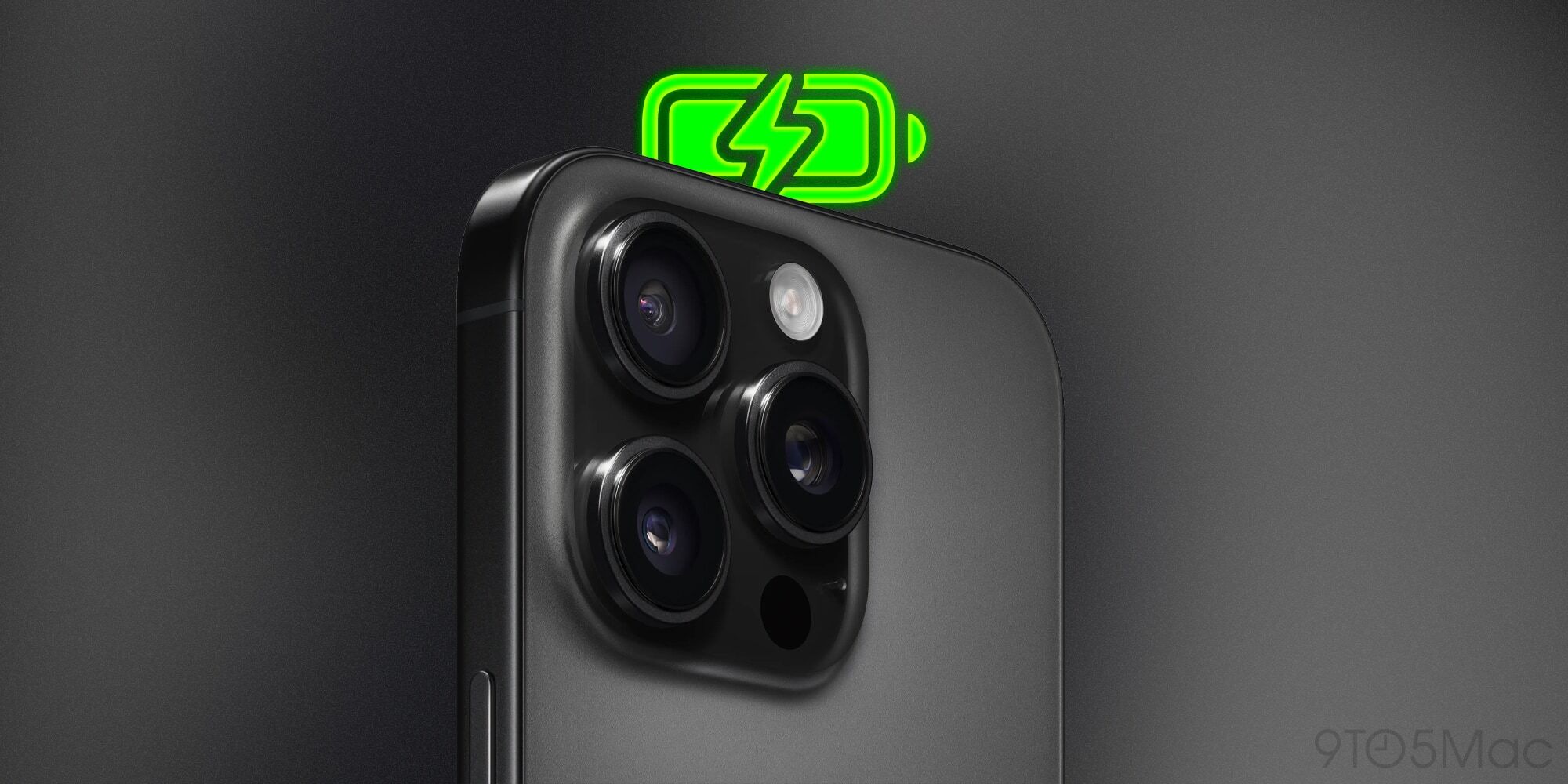
For battery life, the iPhone 16 has received a nice improvement over the iPhone 15 devices.
| iPhone 16 | iPhone 16 Plus | iPhone 16 Pro | iPhone 16 Pro Max | |
| Video playback | 22 hours | 27 hours | 27 hours | Up to 33 hours |
| Audio playback | 80 hours | 100 hours | 85 hours | Up to 105 hours |
For how that compares to iPhone 15, 14, and 13, check out our full post on iPhone 16 battery life:
Cameras
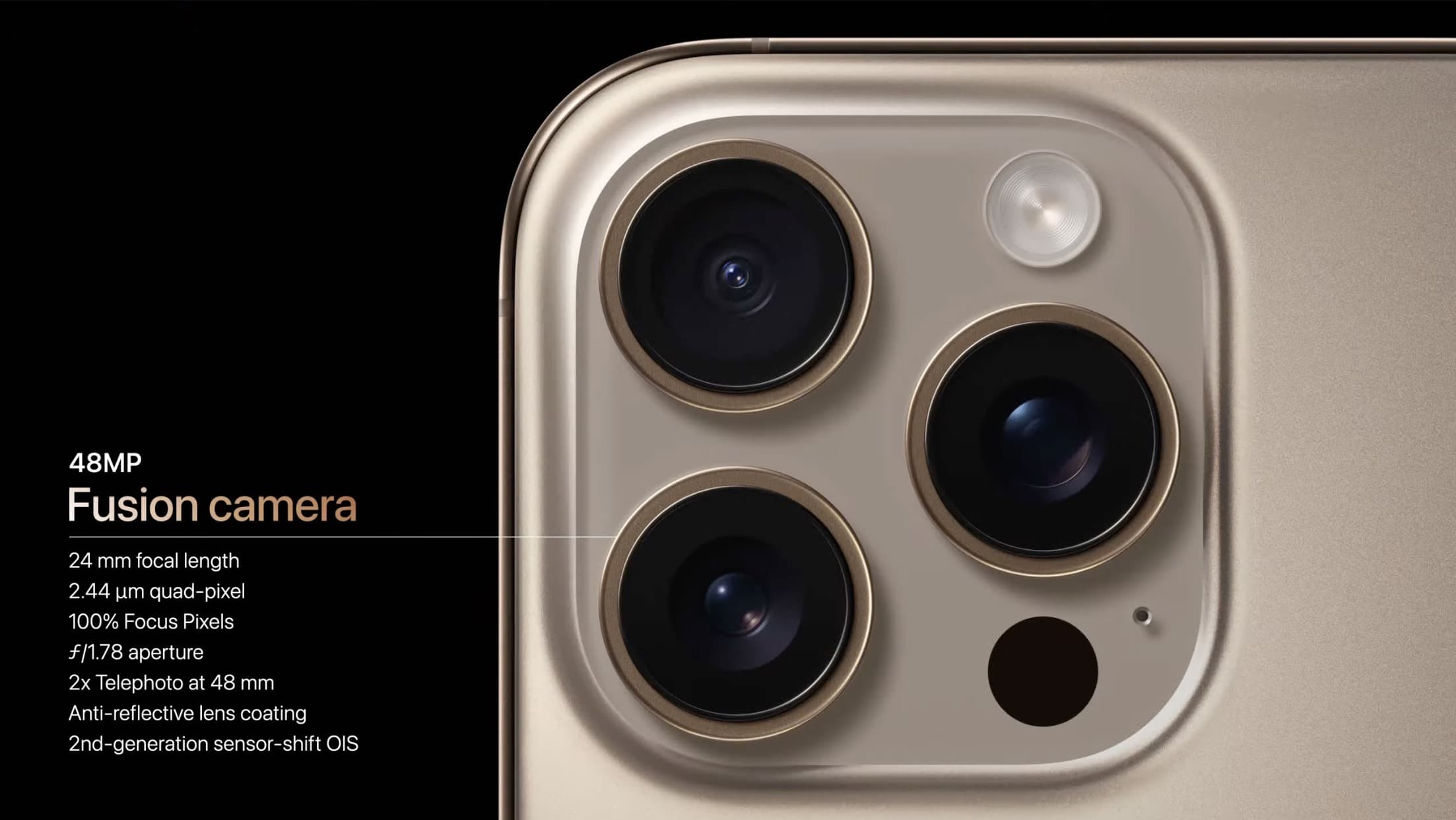
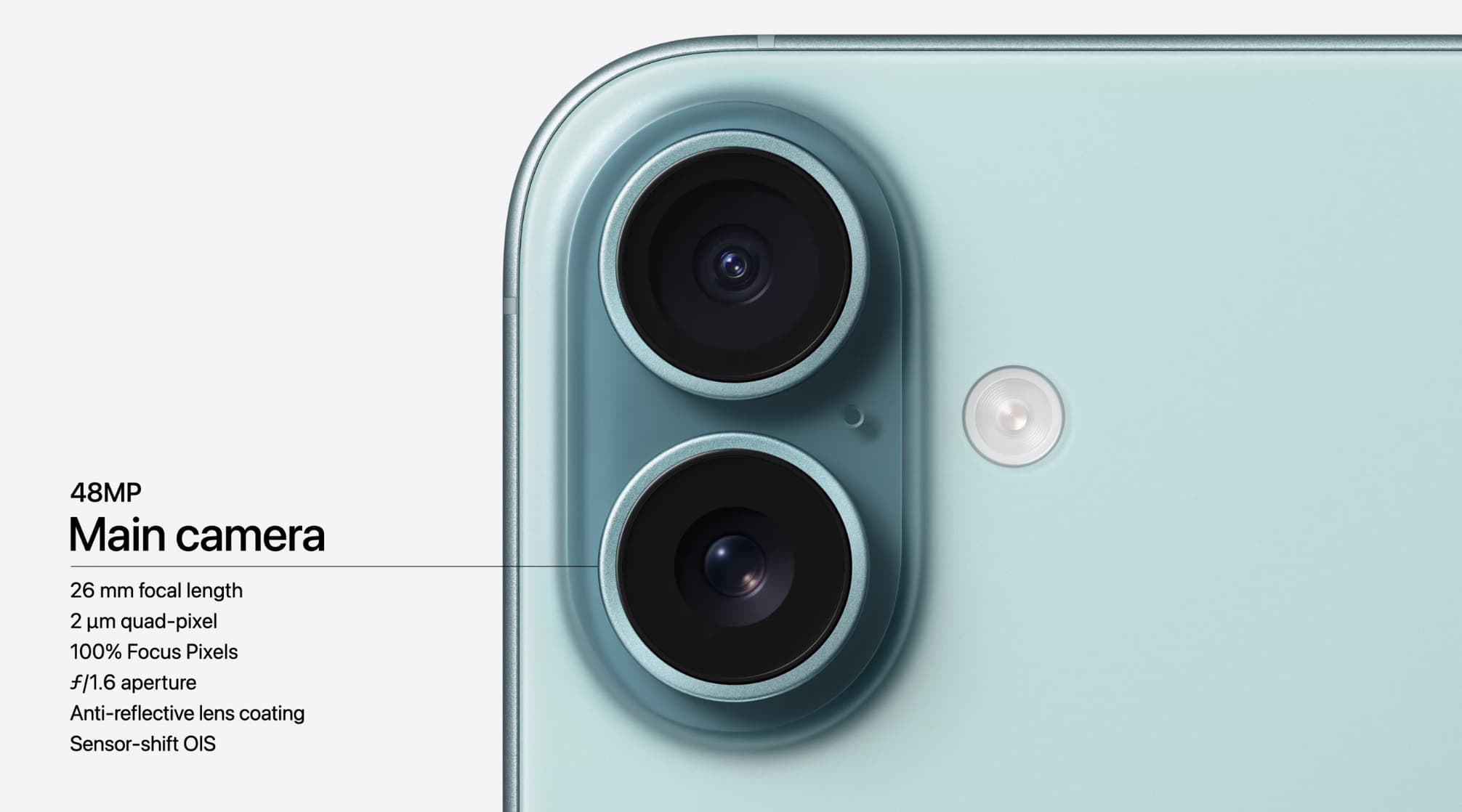
Rear cameras
All the iPhone 16 devices come with a 48MP main rear camera, the all-new Camera Control button/sensor, latest-gen Photographic Styles, and more.
But the 16 Pro and Pro Max continue to stand apart with the most powerful camera systems.
And after giving the iPhone 15 Pro Max camera system more features than the iPhone 15 Pro, the 16 Pro and Pro Max have the same camera systems and capabilities.
| iPhone 16 | iPhone 16 Plus | iPhone 16 Pro | iPhone 16 Pro Max | |
| Camera Control | ✅ | ✅ | ✅ | ✅ |
| Main lens | 48MP, ƒ/1.6 aperture | 48MP, ƒ/1.6 aperture | 48MP, ƒ/1.78 aperture | 48MP, ƒ/1.78 aperture |
| Main lens sensor | 2 µm quad pixel | 2 µm quad pixel | 2.44 µm quad pixel | 2.44 µm quad pixel |
| Main lens focal length | 26 mm | 26 mm | 24 mm | 24 mm |
| Ultra Wide lens | 12MP, ƒ/2.2 aperture | 12MP, ƒ/2.2 aperture | 48MP, ƒ/2.2 aperture | 48MP, ƒ/2.2 aperture |
| Telephoto lens | ❌ (but main lens can do 2x zoom) | ❌ (but main lens can do 2x zoom) | 12MP, ƒ/2.8 aperture (up to 5x zoom) | 12MP, ƒ/2.8 aperture (up to 5x zoom) |
| Stabilization | Sensor-shift optical image stabilization | Sensor-shift optical image stabilization | Sensor-shift optical image stabilization | Sensor-shift optical image stabilization |
| Optical zoom | 0.5x, 1x, and 2x | 0.5x, 1x, and 2x | 0.5x, 1x, 2x, 5x | 0.5x, 1x, 2x, 5x |
| Digital zoom | Up to 10x | Up to 10x | Up to 25x | Up to 25x |
| Flash | True Tone flash | True Tone flash | Adaptive True Tone Flash | Adaptive True Tone Flash |
| Photonic Engine | ✅ | ✅ | ✅ | ✅ |
| Deep Fusion | ✅ | ✅ | ✅ | ✅ |
| Smart HDR 5 | ✅ | ✅ | ✅ | ✅ |
| Next-gen portraits with Focus and Depth Control | ✅ | ✅ | ✅ | ✅ |
| Portrait Lighting with six effects | ✅ | ✅ | ✅ | ✅ |
| Night mode | ✅ | ✅ | ✅ | ✅ |
| Night mode portraits | ❌ | ❌ | ✅ | ✅ |
| Latest-gen Photographic Styles | ✅ | ✅ | ✅ | ✅ |
| Spatial photos | ✅ | ✅ | ✅ | ✅ |
| Macro photography | ✅ | ✅ | ✅ | ✅ |
| Apple ProRAW | ❌ | ❌ | ✅ | ✅ |
Video recording
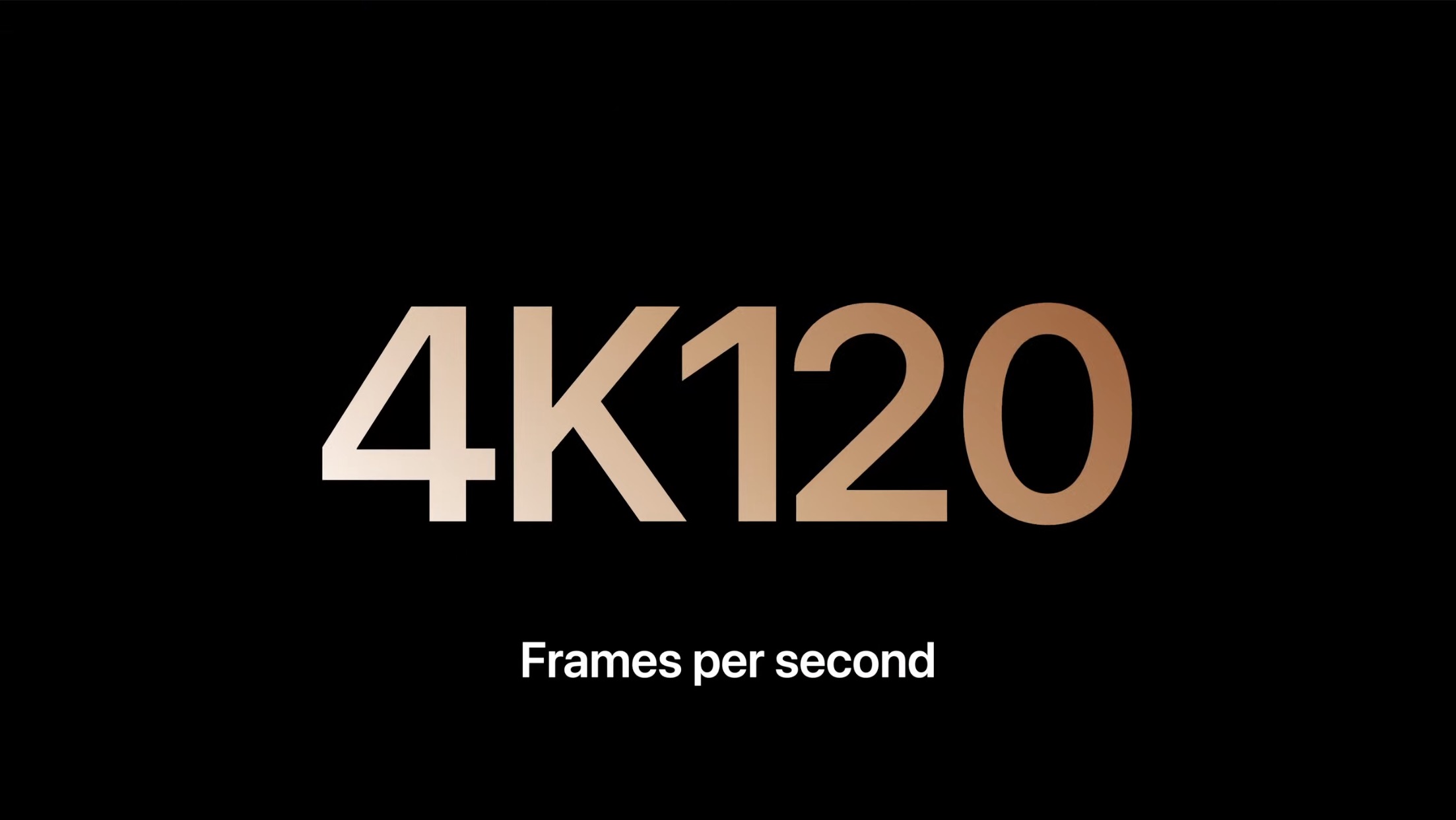
iPhone 16 Pro and Pro Max include new power-user features like 4K Dolby Vision/HDR video recording at up to 120 fps.
But the iPhone 16 and 16 Plus still have fantastic cameras for both photos and video. Here’s how they stack up:
| iPhone 16 | iPhone 16 Plus | iPhone 16 Pro | iPhone 16 Pro Max | |
| 4K Dolby Vision/HDR recording | ✅ – at 24, 25, 30, or 60 fps | ✅ – at 24, 25, 30, or 60 fps | ✅ – at 24, 25, 30, 60, 100, or 120 fps | ✅ – at 24, 25, 30, 60, 100, or 120 fps |
| 1080p recording | ✅ – at 25, 30, or 60 fps | ✅ – at 25, 30, or 60 fps | ✅ – at 25, 30, or 60, or 120 fps | ✅ – at 25, 30, or 60, or 120 fps |
| Cinematic mode | ✅ – up to 4K HDR at 30 fps | ✅ – up to 4K HDR at 30 fps | ✅ – up to 4K HDR at 30 fps | ✅ – up to 4K HDR at 30 fps |
| Action mode | ✅ – up to 2.8K at 60 fps | ✅ – up to 2.8K at 60 fps | ✅ – up to 2.8K at 60 fps | ✅ – up to 2.8K at 60 fps |
| ProRes recording | ❌ | ❌ | ✅ – up to 4K at 120 fps with external recording | ✅ – up to 4K at 120 fps with external recording |
| Log video recording | ❌ | ❌ | ✅ | ✅ |
| Academy Color Encoding System | ❌ | ❌ | ✅ | ✅ |
| Macro video recording | ✅ | ✅ | ✅ | ✅ |
| Spatial video recording | ✅ – at 1080p at 30 fps | ✅ – at 1080p at 30 fps | ✅ – at 1080p at 30 fps | ✅ – at 1080p at 30 fps |
| Slo-mo recording | ✅ –1080p at 120 fps or 240 fps | ✅ –1080p at 120 fps or 240 fps | ✅ – 1080p up to 240 fps and 4K Dolby Vision up to 120 fps | ✅ – 1080p up to 240 fps and 4K Dolby Vision up to 120 fps |
| Time-lapse with stabilization | ✅ | ✅ | ✅ | ✅ |
| Night mode Time-lapse | ✅ | ✅ | ✅ | ✅ |
| QuickTake video | ✅ – up to 4K at 60 fps in Dolby Vision | ✅ – up to 4K at 60 fps in Dolby Vision | ✅ – up to 4K at 60 fps in Dolby Vision | ✅ – up to 4K at 60 fps in Dolby Vision |
| Stabilization | Sensor-shift optical image stabilization for video | Sensor-shift optical image stabilization for video | 2nd-gen sensor-shift optical image stabilization for video 3D sensor‑shift optical image stabilization and autofocus for video (Telephoto) | 2nd-gen sensor-shift optical image stabilization for video 3D sensor‑shift optical image stabilization and autofocus for video (Telephoto) |
| Cinematic video stabilization | ✅ – for 4K, 1080p, and 720p | ✅ – for 4K, 1080p, and 720p | ✅ – for 4K, 1080p, and 720p | ✅ – for 4K, 1080p, and 720p |
| Audio zoom | ✅ | ✅ | ✅ | ✅ |
| Stereo recording | ✅ | ✅ | ✅ | ✅ |
| 4 studio quality mics | ❌ | ❌ | ✅ | ✅ |
| True tone flash | ✅ | ✅ | ✅ | ✅ |
| Wind noise reduction | ✅ | ✅ | ✅ | ✅ |
| Audio Mix | ✅ | ✅ | ✅ | ✅ |
| Continuous autofocus video | ✅ | ✅ | ✅ | ✅ |
| Playback zoom | ✅ | ✅ | ✅ | ✅ |
Selfie camera
Apple’s TrueDepth front camera on the iPhone 16 models gets a few upgrades with the 16/Plus having most of the features found with the 16 Pro and Pro Max.
| iPhone 16 | iPhone 16 Plus | iPhone 16 Pro | iPhone 16 Pro Max | |
| TrueDepth front camera | 12MP, ƒ/1.9 aperture | 12MP, ƒ/1.9 aperture | 12MP, ƒ/1.9 aperture | 12MP, ƒ/1.9 aperture |
| Autofocus with Focus Pixels | ✅ | ✅ | ✅ | ✅ |
| Retina Flash | ✅ | ✅ | ✅ | ✅ |
| Photonic Engine | ✅ | ✅ | ✅ | ✅ |
| Deep Fusion | ✅ | ✅ | ✅ | ✅ |
| Smart HDR 5 for photos | ✅ | ✅ | ✅ | ✅ |
| Next-gen portraits with Focus and Depth Control | ✅ | ✅ | ✅ | ✅ |
| Portrait Lighting with six effects | ✅ | ✅ | ✅ | ✅ |
| Animoji and Memoji | ✅ | ✅ | ✅ | ✅ |
| Night mode | ✅ | ✅ | ✅ | ✅ |
| Night mode time-lapse | ✅ | ✅ | ✅ | ✅ |
| Latest-gen Photographic Styles | ✅ | ✅ | ✅ | ✅ |
| Lens correction | ✅ | ✅ | ✅ | ✅ |
| Auto image stabilization | ✅ | ✅ | ✅ | ✅ |
| Wide color capture for photos and Live Photos | ✅ | ✅ | ✅ | ✅ |
| 4K Dolby Vision/HDR recording | ✅ – at 24, 25, 30, or 60 fps | ✅ – at 24, 25, 30, or 60 fps | ✅ – at 24, 25, 30, or 60 fps | ✅ – at 24, 25, 30, or 60 fps |
| 1080p Dolby Vision recording | ✅ – at 25, 30, or 60 fps | ✅ – at 25, 30, or 60 fps | ✅ – at 25, 30, or 60 fps | ✅ – at 25, 30, or 60 fps |
| Cinematic mode | ✅ – up to 4K Dolby Vision HDR at 30 fps | ✅ – up to 4K HDR at 30 fps | ✅ – up to 4K HDR at 30 fps | ✅ – up to 4K HDR at 30 fps |
| Apple ProRAW | ❌ | ❌ | ✅ | ✅ |
| ProRes recording | ❌ | ❌ | ✅ – up to 4K HDR at 60 fps with external recording | ✅ – up to 4K HDR at 60 fps with external recording |
| Log video recording | ❌ | ❌ | ✅ | ✅ |
| Slo-mo recording | ✅ –1080p at 120 fps | ✅ –1080p at 120 fps | ✅ –1080p at 120 fps | ✅ –1080p at 120 fps |
| QuickTake video | ✅ – up to 4K at 60 fps in Dolby Vision | ✅ – up to 4K at 60 fps in Dolby Vision | ✅ – up to 4K at 60 fps in Dolby Vision | ✅ – up to 4K at 60 fps in Dolby Vision |
| Cinematic video stabilization | ✅ – for 4K, 1080p, 720p | ✅ – for 4K, 1080p, 720p | ✅ – for 4K, 1080p, 720p | ✅ – for 4K, 1080p, 720p |
| Spatial Audio and stereo recording | ✅ | ✅ | ✅ | ✅ |
iPhone 16 vs 16 Pro I/O
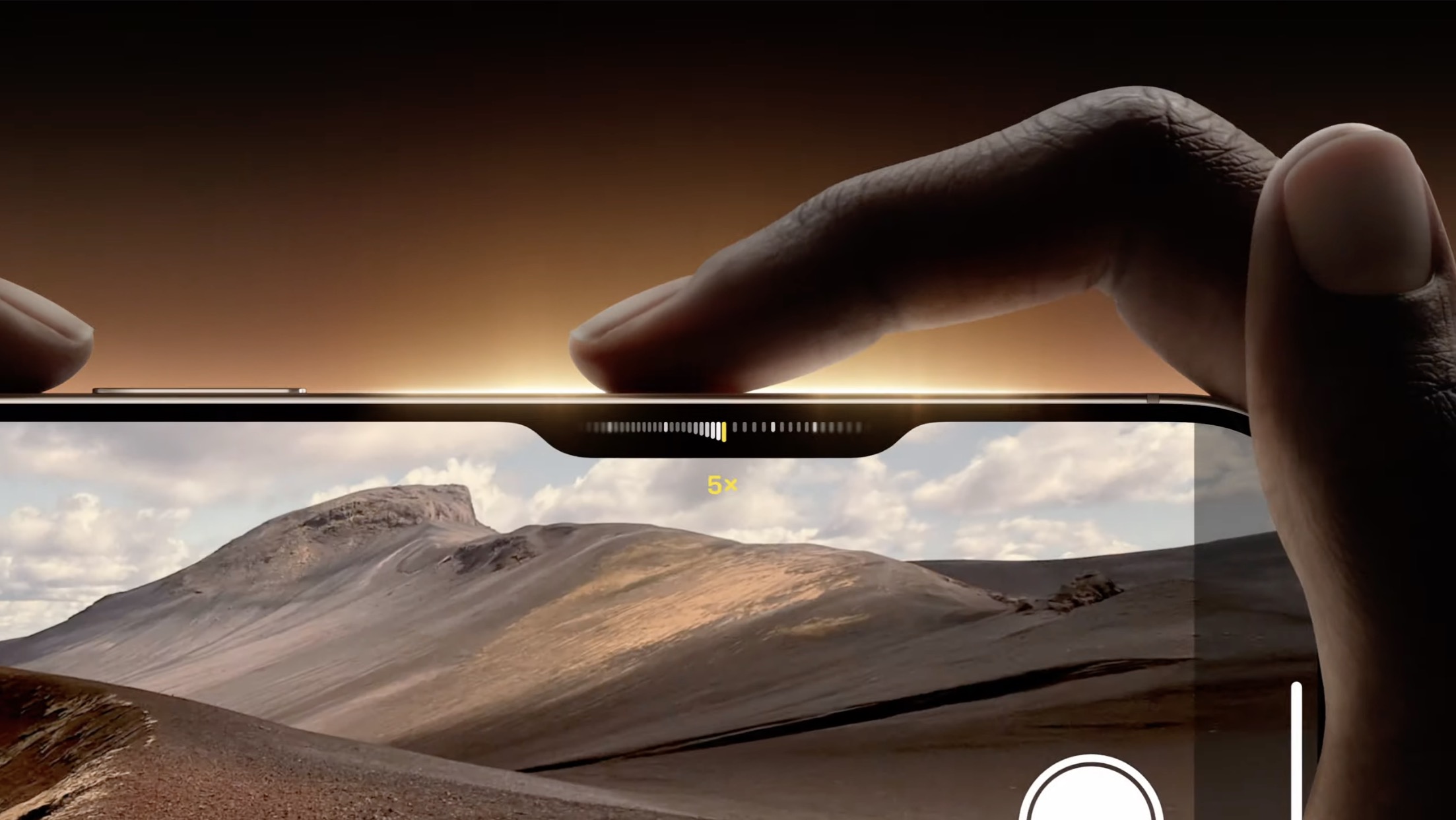
After the big switch to USB-C with the iPhone 15 lineup, iPhone 16 devices don’t bring as much of a shift with I/O.
The biggest I/O update may be the new Camera Control, but there are some other upgrades like WiFi 7 support, MagSafe supporting up to 25W or wireless power, and more.
iPhone 16 uses the much slower USB 2 compared to USB 3 with the 16 Pro and Pro Max.
| iPhone 16 | iPhone 16 Plus | iPhone 16 Pro | iPhone 16 Pro Max | |
| USB-C | ✅ – USB 2 up to 480Mbps | ✅ – USB 2 up to 480Mbps | ✅ – USB 3 up to 10Gbps | ✅ – USB 3 up to 10Gbps |
| WiFi | 7 | 7 | 7 | 7 |
| Bluetooth | 5.3 | 5.3 | 5.3 | 5.3 |
| UWB Gen 2 | ✅ | ✅ | ✅ | ✅ |
| NFC with reader mode | ✅ | ✅ | ✅ | ✅ |
| Thread | ✅ | ✅ | ✅ | ✅ |
| Cellular | GSM/EDGE, UMTS/HSPA+, DC-HSDPA | GSM/EDGE, UMTS/HSPA+, DC-HSDPA | GSM/EDGE, UMTS/HSPA+, DC-HSDPA | GSM/EDGE, UMTS/HSPA+, DC-HSDPA |
| 5G | Sub-6 GHz and mmWave with 4×4 MIMO | Sub-6 GHz and mmWave with 4×4 MIMO | Sub‑6 GHz and mmWave with 4×4 MIMO | Sub‑6 GHz and mmWave with 4×4 MIMO |
| 4G | Gigabit LTE with 4×4 MIMO and LAA | Gigabit LTE with 4×4 MIMO and LAA | Gigabit LTE with 4×4 MIMO and LAA | Gigabit LTE with 4×4 MIMO and LAA |
| GPS | GPS, GLONASS, Galileo, QZSS, and BeiDou | GPS, GLONASS, Galileo, QZSS, and BeiDou | Precision dual-frequency GPS (GPS, GLONASS, Galileo, QZSS, BeiDou, and NavIC) | Precision dual-frequency GPS (GPS, GLONASS, Galileo, QZSS, BeiDou, and NavIC) |
| Audio playback | Spatial audio/Dolby Atmos | Spatial audio/Dolby Atmos | Spatial audio/Dolby Atmos | Spatial audio/Dolby Atmos |
| Video playback | HDR with Dolby Vision, HDR10, and HLG | HDR with Dolby Vision, HDR10, and HLG | HDR with Dolby Vision, HDR10, and HLG | HDR with Dolby Vision, HDR10, and HLG |
| SIM | Dual eSIM in US | Dual eSIM in US | Dual eSIM in US | Dual eSIM in US |
| MagSafe | ✅ with 25W charging | ✅ with 25W charging | ✅ with 25W charging | ✅ with 25W charging |
| Qi and Qi2 | Yes | Yes | Yes | Yes |
iPhone 16 vs 16 Pro colors
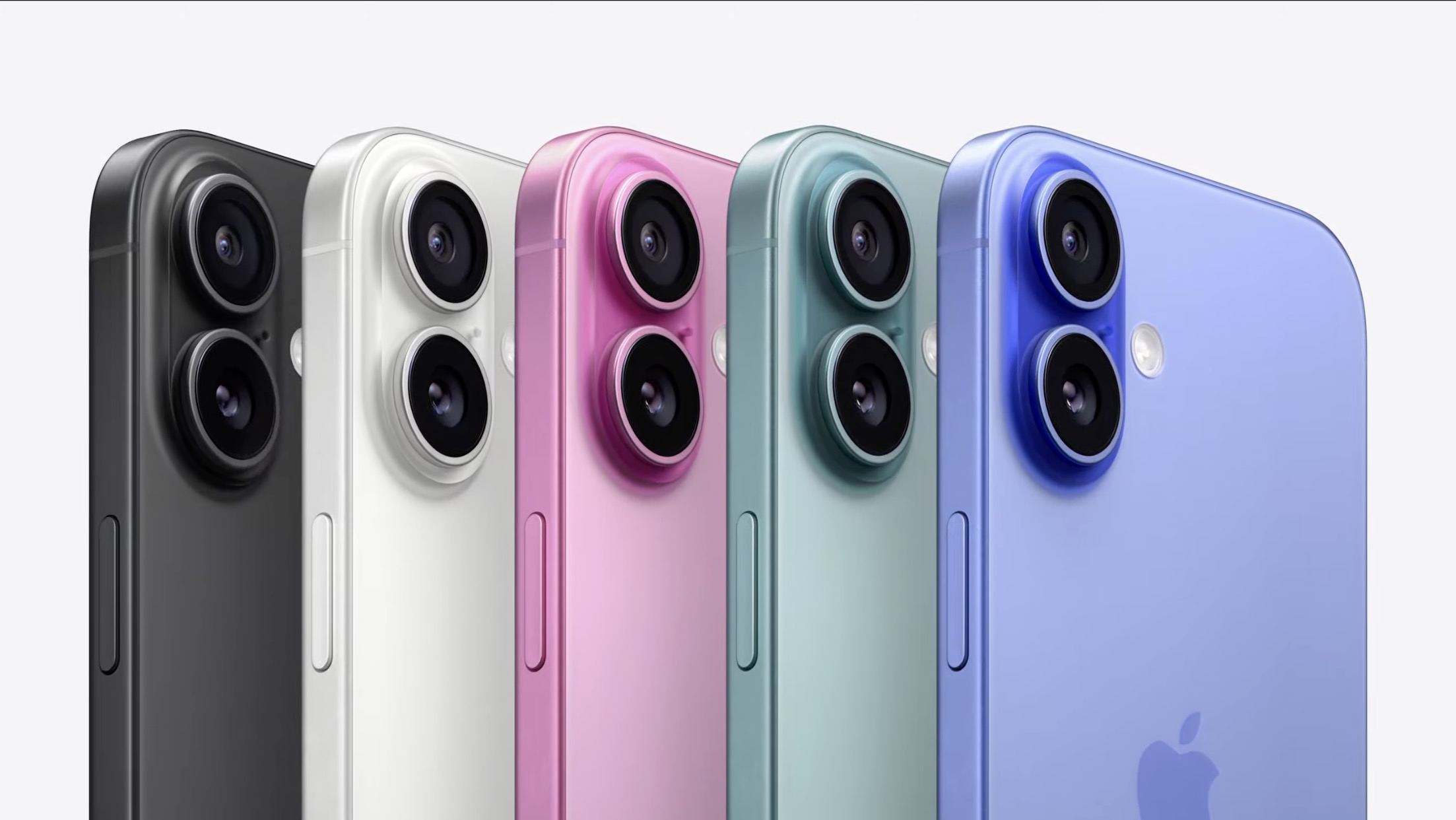
iPhone 16 and 16 Plus come in these five colors:
- Black
- White
- Pink
- Teal
- Ultramarine
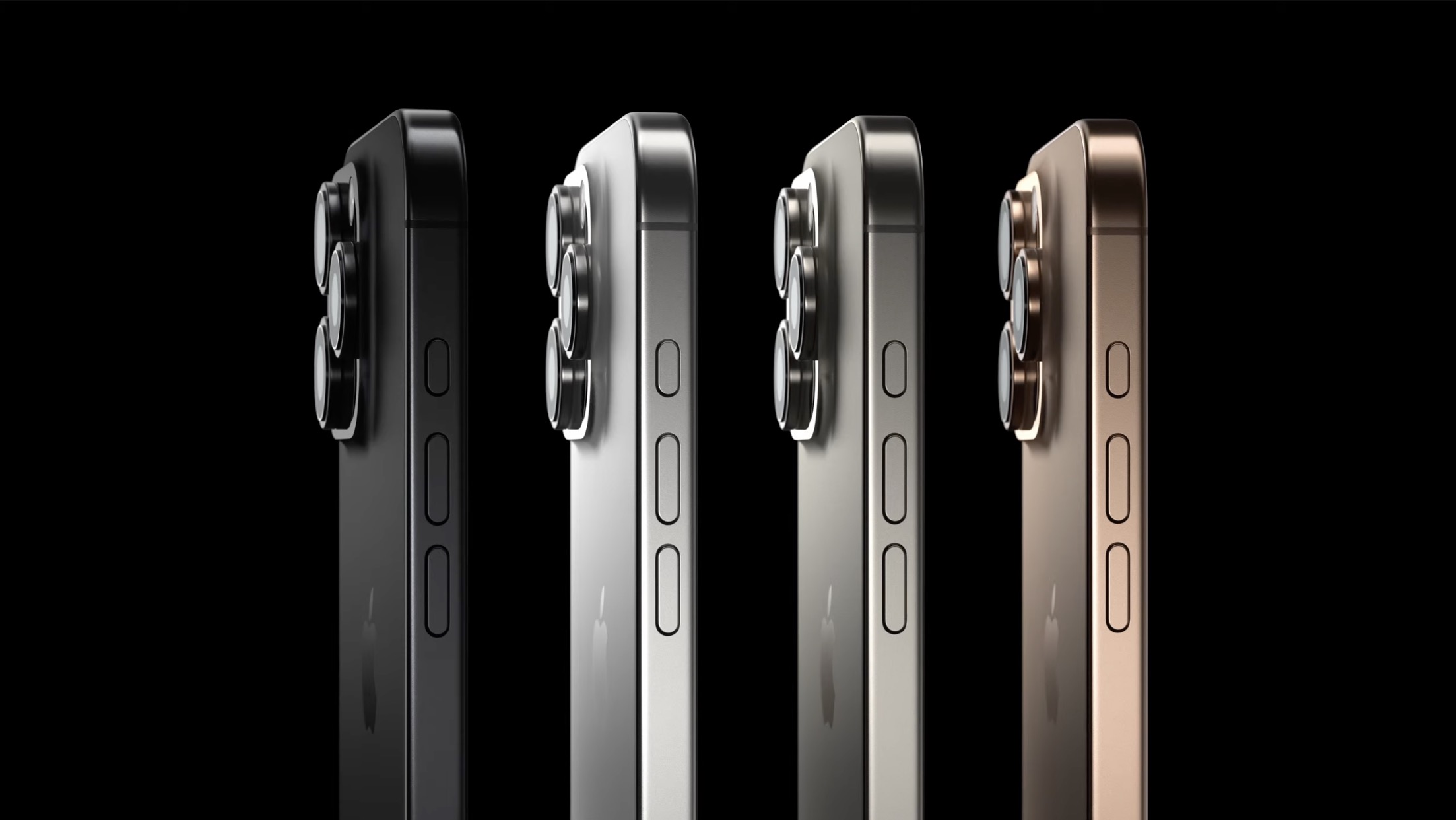
And iPhone 16 Pro and Pro Max are available in:
- Black titanium
- White titanium
- Natural titanium
- Desert titanium
Storage and pricing
iPhone 16 and 16 Plus come in these storage options:
- 128GB – $799 / $899
- 256GB – $899 / $999
- 512GB – $1,099 / $1,199
iPhone 16 Pro and Pro Max come in:
- 128GB – $999 (only 16 Pro available in 128GB)
- 256GB – $1,099 / $1,199
- 512GB – $1,299 / $1,399
- 1TB – $1,499 / $1,599
What’s in the box?
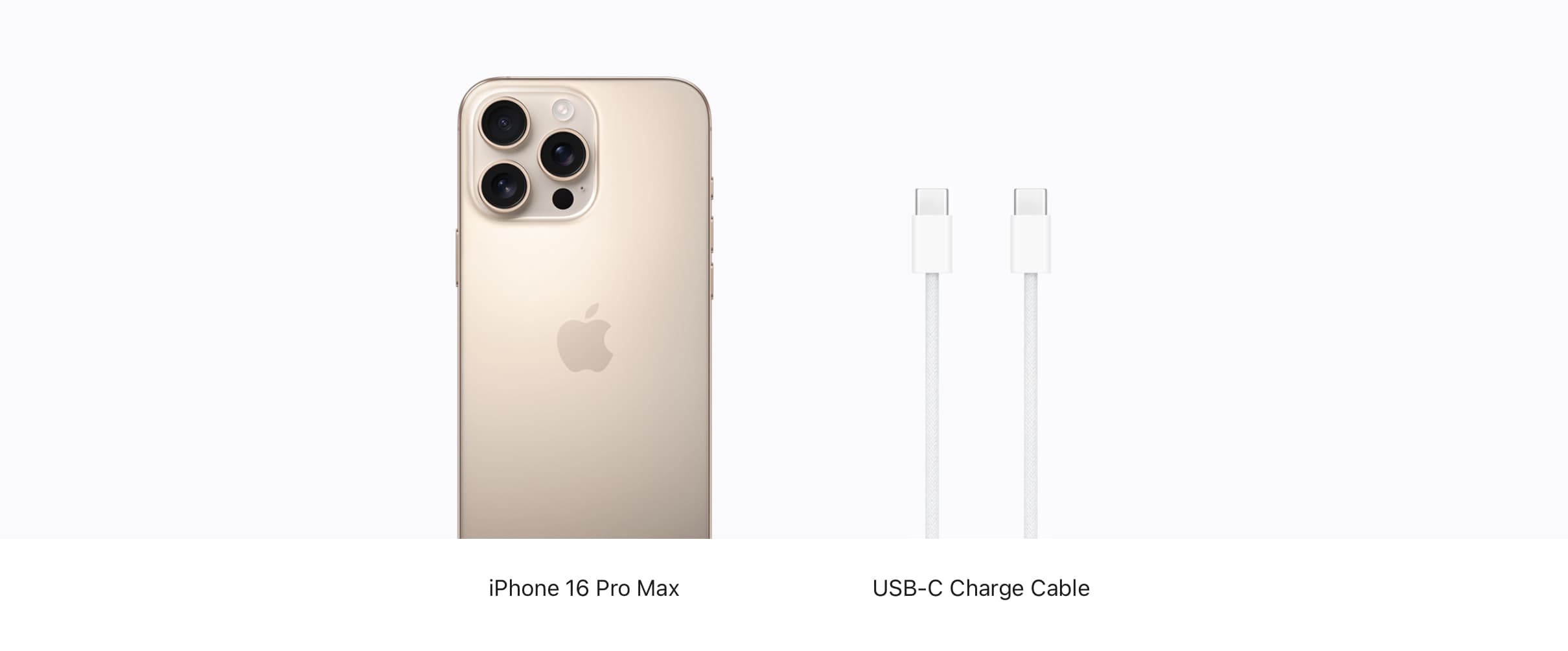
All of the iPhone 16 devices just come with the iPhone and a USB-C cable in the box.
If you need a power adapter, go with at least a 20W so you get fast charging for your iPhone. Good options include:
- Anker 20W Nano Pro (super compact)
- Nomad 20W power adapter (black finish and compact)
- Apple’s official 20W adapter
iPhone 16 vs 16 Pro: Which should you buy?
All of the new iPhones are super powerful and capable devices, but which one is best for you will come down to how you want to use your iPhone and what features you value.
Keep in mind both iPhone 16 and 16 Pro feature Apple Intelligence support and have the new Camera Control button/sensor.
Reasons to buy iPhone 16 Pro or Pro Max
- Most powerful and capable cameras for both photos and video
- Titanium build with very slim bezels
- USB-C with 10Gbps speeds, WiFi 7 support
- Fastest chip, most powerful GPU for video and mobile gaming
- Always-On display and ProMotion refresh rates up to 120Hz
- Storage up to 1TB
Reasons to buy iPhone 16 or 16 Plus
- If the 6 features above aren’t deal breakers for you, save your money and grab the iPhone 16 which includes most of the other new features this year (or keep your older iPhone 😁).
- You could also consider grabbing an iPhone 15 Pro if you’d like Apple Intelligence support but don’t want/need the latest 16/16 Pro features.
You can buy iPhone 16 and 16 Pro from Apple, your carrier, and more.
What are you planning to do? Upgrade? Keep your current iPhone? Let us know in the comments!
Thanks for reading our guide on iPhone 16 vs 16 Pro!
FTC: We use income earning auto affiliate links. More.






Comments